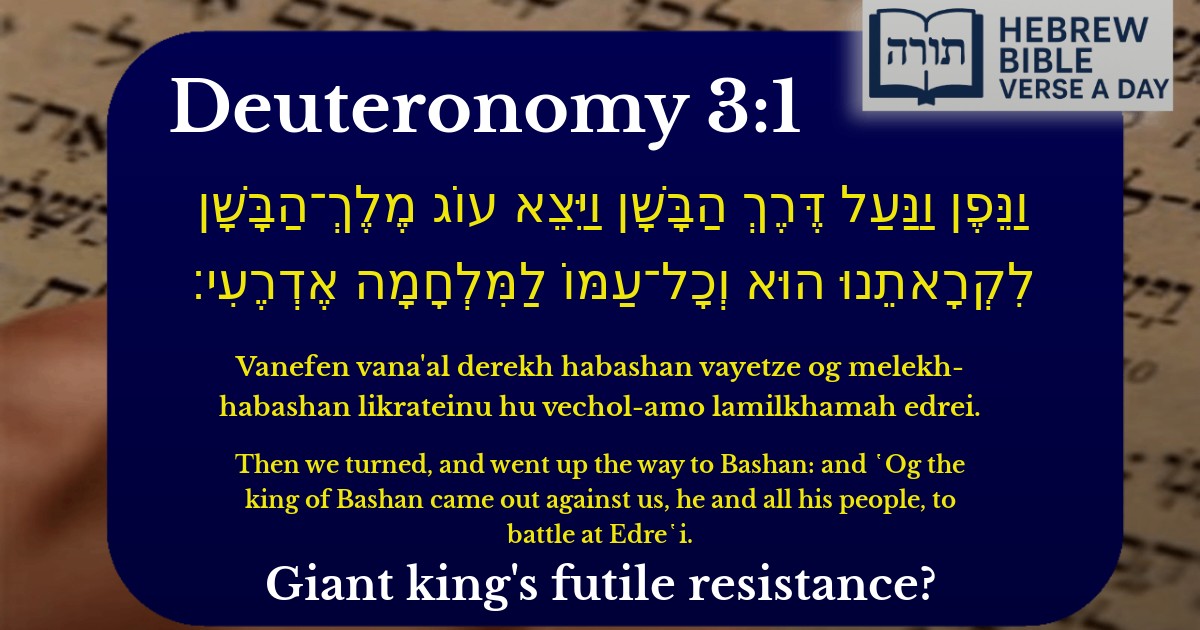Join Our Newsletter To Be Informed When New Videos Are Posted
Join the thousands of fellow Studends who rely on our videos to learn how to read the bible in Hebrew for free!
Hebrew Text
וַנֵּפֶן וַנַּעַל דֶּרֶךְ הַבָּשָׁן וַיֵּצֵא עוֹג מֶלֶךְ־הַבָּשָׁן לִקְרָאתֵנוּ הוּא וְכָל־עַמּוֹ לַמִּלְחָמָה אֶדְרֶעִי׃
English Translation
Then we turned, and went up the way to Bashan: and ῾Og the king of Bashan came out against us, he and all his people, to battle at Edre῾i.
Transliteration
Vanefen vana'al derekh habashan vayetze og melekh-habashan likrateinu hu vechol-amo lamilkhamah edrei.
Hebrew Leining Text
וַנֵּ֣פֶן וַנַּ֔עַל דֶּ֖רֶךְ הַבָּשָׁ֑ן וַיֵּצֵ֣א עוֹג֩ מֶֽלֶךְ־הַבָּשָׁ֨ן לִקְרָאתֵ֜נוּ ה֧וּא וְכׇל־עַמּ֛וֹ לַמִּלְחָמָ֖ה אֶדְרֶֽעִי׃
וַנֵּ֣פֶן וַנַּ֔עַל דֶּ֖רֶךְ הַבָּשָׁ֑ן וַיֵּצֵ֣א עוֹג֩ מֶֽלֶךְ־הַבָּשָׁ֨ן לִקְרָאתֵ֜נוּ ה֧וּא וְכׇל־עַמּ֛וֹ לַמִּלְחָמָ֖ה אֶדְרֶֽעִי׃
🎵 Listen to leining
Parasha Commentary
📚 Talmud Citations
This verse is quoted in the Talmud.
📖 Berakhot 54b
The verse is referenced in the context of discussing the miracles performed for the Israelites, particularly the defeat of Og, king of Bashan, highlighting God's intervention in battle.
📖 Niddah 61a
The verse is mentioned in a discussion about the physical stature and strength of Og, king of Bashan, and his defeat by the Israelites under Moses' leadership.


Context of the Verse
The verse (Devarim 3:1) recounts the Israelites' encounter with Og, king of Bashan, as they approached the Land of Israel. This event occurred after their victory over Sichon, king of the Amorites, and was part of the conquest of Transjordan before entering Eretz Yisrael.
Og's Background and Significance
Rashi (Devarim 3:1) explains that Og was a survivor of the generation of the Flood, citing the Midrash (Bereishit Rabbah 42:8) which identifies him as the fugitive who informed Avraham about Lot's capture (Bereishit 14:13). The Talmud (Niddah 61a) describes Og as a giant with extraordinary longevity, emphasizing his fearsome reputation.
The Battle Strategy
The phrase "וַיֵּצֵא עוֹג... לִקְרָאתֵנוּ" ("Og came out against us") is interpreted by Ramban (Devarim 3:1) as a preemptive strike by Og, who sought to attack Israel before they could invade his territory. The Midrash (Devarim Rabbah 1:22) elaborates that Og uprooted a mountain to hurl at the Israelites, but Moshe, empowered by Hashem, defeated him with Divine assistance.
Spiritual Dimensions of the Battle
Lessons from the Encounter
The Sforno (Devarim 3:2) teaches that this victory demonstrated Hashem's promise to deliver even seemingly invincible enemies into Israel's hands, reinforcing the need for trust in Divine providence during conquest. The Or HaChaim adds that Og's defeat was a necessary step in removing spiritual barriers before entering the Land, as his evil influence could have hindered Israel's mission.